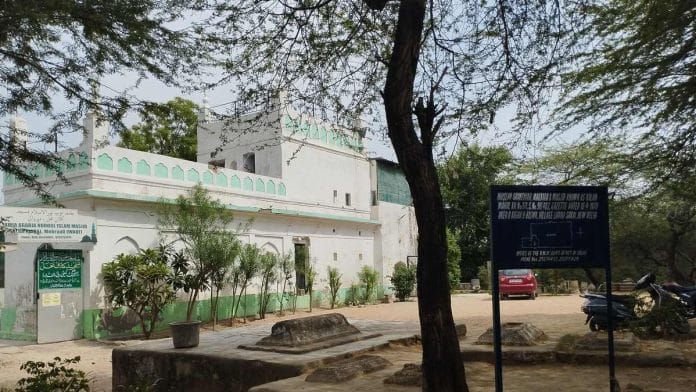New Delhi: The Modi government has proposed sweeping changes to The Waqf Act of 1995, including redifining waqf, giving more powers to the Centre in waqf matters, curtailing the power of waqf boards, allowing inclusion of non-Muslim members and women in waqf boards for the first time, among others.
The Waqf (Amendment) Bill, which is likely to be tabled in the Parliament in the current session, also proposes to rename the current Act as the ‘Unified Waqf Management, Empowerment, Efficiency and Development Act, 1995’.
Waqf has been clearly defined as the “permanent dedication by any person practising Islam for at least five years, of any movable or immovable property, having ownership of such property.”
In a move to address the issue of misuse of such properties, wrongful declaration of waqf properties and to protect government properties from being declared waqf properties, the bill proposes to have a centralised system for registration of waqf properties, empowering collectors to carry out survey of Waqf properties instead of survey commissioners of waqf boards, among others.
One of the major issues with the present Act is the powers given to Waqf boards to declare a property as “waqf property”. The bill proposes to curtail the powers of the Waqf boards by omitting section 40 of the Waqf Act, which gives powers to the waqf boards to decide if a property is a “waqf property”.
The Centre has proposed new sections to address issues, mentioning that no person can create a waqf if he is not the lawful owner of the property. All waqf properties have to be listed on a centralised portal with details of its owner, identification of boundaries, etc.
It also proposes to omit “the decision of the Tribunal in respect of such matter shall be final” from almost all sections of the Act.
The bill provides for reforming the Tribunal structure with two members and providing for appeals against the orders of the Tribunal to the High Court within a specified period of 90 days.
Also read: India’s 3rd-largest landlords, waqf boards are beset with litigations, demolitions, bias
‘Protecting govt properties from being declared waqf’
According to the existing Act, once a property is declared a waqf, it remains so forever.
This has led to several problems with many government buildings being claimed as waqf property. According to sources, the Surat Municipal Corporation building was declared as the waqf property by the Gujarat Waqf board in 2021 due to its historical use as sarai (inn) during Hajj in the Mughal era. But the waqf board order was challenged in the tribunal. In April this year, the tribal quashed the waqf board order, according to media reports.
In Delhi, there is a long-standing dispute over 123 properties, including dargahs, mosques, etc. The government had inherited these properties, located mostly in central Delhi, after Independence. In 2014, the then UPA government decided to de-notify these properties and transfer it to the Delhi Waqf Board.
After coming to power in 2014, the NDA government initiated the process to reclaim these properties. Last year, the Ministry of Housing and Urban Affairs started the process to take over these properties.
The bill proposes to insert new sections, detailing the process under which a property can be declared a waqf. The collectors, instead of survey commissioners under the present Act, will be responsible for carrying out surveys of waqf properties. The bill proposes a centralised system, including a database, and will provide for a detailed procedure “for mutation as per revenue laws with due notice to all concerned before recording any property as waqf property”.
The bill proposes to protect government properties from being declared as waqf. “Any government property identified or declared as waqf property, before or after the commencement of this Act, shall not be deemed to be a waqf property,” according to the bill.
The need for an amendment was felt as the present Act has not “proved effective in improving the administration of auqaf”.
Auqaf is an asset dedicated and notified as waqf.
The statement of objects and reasons by Union minority affairs minister Kiren Rijiju said, “Despite the amendments (in 2013), it has been observed that the Act still requires further improvement to effectively address issues related to the powers of the State Waqf Boards, registration and survey of waqf properties, removal of encroachments, including the definition of the “waqf” itself.”
The bill proposes to insert a new section (section 108B) to confer powers to the Centre to make rules regarding waqf properties.
Composition of central council and waqf boards
The bill proposes several changes in the composition of the Central Waqf Council and the Waqf boards in states and Union territories. It also provides for separate boards for Bohras and Aghakhanis.
It provides for inclusion of two women members and two non-Muslim members in the central council and state boards.
In a major departure from the present Act, which was amended in 2013, the bill proposes to do away with the clause mandating that the chief executive officer of waqf boards is from the Muslim community.
It also proposes to amend the section relating to the power of the chief executive officer to direct banks or people to make payments and to omit the expression “and the decision of the Tribunal on such appeal shall be final”.
Also read: Modi govt gets support from dargah association for proposal to amend Waqf Act






